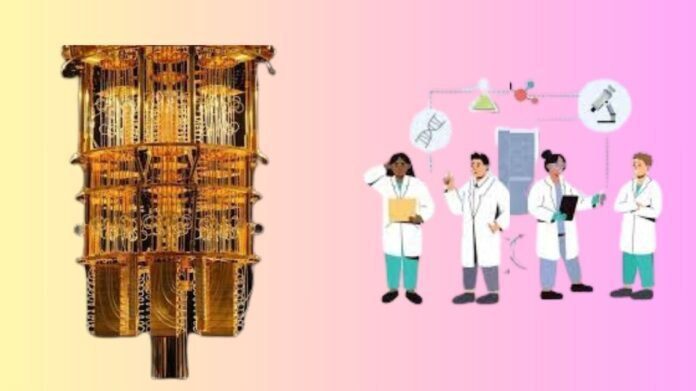Introduction
Innovations in medical research, diagnosis, and therapy could be revolutionary in this quickly developing arena where quantum computing and healthcare meet. Utilizing quantum generative models is among the most fascinating advancements in this field. The way we tackle healthcare problems could be revolutionized by these models, which use the special principles of quantum mechanics to build complex data patterns. The prospective applications, underlying theories, and long-term effects of quantum generative models in healthcare are examined in this article.
Understanding Quantum Generative Models
What Are Quantum Generative Models?
Within the field of quantum machine learning, quantum generative models employ quantum systems to produce new data that has similarities to a given dataset. Quantum generative models leverage the concepts of quantum mechanics, such as superposition and entanglement, to conduct computations in ways that classical systems are unable to, in contrast to conventional generative models, which rely on classical algorithms and hardware.
Quantum Generative Models: Essential Ideas
- Multi-state quantum systems are possible thanks to the concept of quantum superposition. Superposition allows one to generate fresh data while exploring an extensive array of possibilities in the context of generative models.
- The correlation of quantum states between several particles is known as quantum entanglement. In order to improve the model’s capacity to provide accurate and well-organized data, this phenomena can be utilized to establish intricate links between data points.
- A useful tool for increasing the likelihood of desired outcomes while suppressing less likely ones is quantum interference. Ensuring that the generated data closely resembles the original dataset is of utmost importance.
Drug Development and Healthcare Applications of Quantum Generative Models
Using quantum generative models for drug research and discovery is one of their most exciting uses. Screening large libraries of chemicals to find possible candidates is a traditional approach to drug discovery. Time and money are wasted on this process. Simulating and creating novel chemical structures that may interact with biological targets is something that quantum generative models can do to speed up this process.
To find promising treatment possibilities more quickly, for instance, researchers can use quantum models to anticipate how certain chemical compounds may interact to particular proteins. Furthermore, by producing unique molecular structures that may be difficult to find using traditional techniques, these models may contribute to the creation of novel therapeutics.
Personalized Health Care
With the use of their specific genetic makeup and medical circumstances, personalized medicine seeks to customize care for each patient. With its ability to analyze complicated genetic data and anticipate individual responses to diverse treatments, quantum generative models have the potential to improve personalized medicine.
These models can discover patterns and connections that may be overlooked by traditional methods by utilizing the speed with which big datasets may be processed and analyzed by quantum computing. Increased precision in treatment outcome prediction and more customized treatment regimens may result from this capacity.
Medical imaging
Compiling and interpreting the massive volumes of data produced by medical imaging technology, such CT and MRI scans, can be difficult. With their ability to produce high-resolution images and increase the precision of diagnostic instruments, quantum generative models can help improve medical imaging.
In order to train machine learning algorithms for improved image analysis, quantum models, for example, can be utilized to mimic and produce realistic medical images. Through this method, anomaly detection, picture reconstruction quality, and diagnostic precision can all be increased.
Predictive analytics
In the healthcare industry, predictive analytics is the process of projecting future medical results using past data. Better forecasts of the course of disease and the effectiveness of treatment are made possible by quantum generative models, which provide realistic and accurate simulations of patient data.
Healthcare providers can enhance their understanding of patient health trends and make well-informed judgments regarding treatments and preventive actions by utilizing quantum models to simulate diverse situations and outcomes.
Future Prospects and Difficulties
The technical difficulties
Quantum generative models have several technological obstacles, notwithstanding their potential. Construction of quantum systems with enough qubits and low error rates is a major challenge, and quantum computing hardware is still in its infancy. Research on creating effective quantum algorithms that can beat their classical equivalents is still underway.
Information Security and Privacy
Security and privacy of data are major concerns when using quantum generative models in the medical field. Due to the fact that quantum models generate and analyze sensitive health data, it is imperative that patient data be safeguarded and used appropriately. Resolving these issues will need the creation of strong data protection policies and legal frameworks.
Combination with Traditional Systems
One other problem is integrating quantum generative models with the current traditional healthcare systems. Harnessing the full potential of quantum computing while ensuring compatibility with existing technologies would need researchers and practitioners to devise ways to combine quantum and classical methodologies in a seamless manner.
To sum up
Quantum generative models could change drug discovery, tailored medicine, medical imaging, and predictive analytics. Quantum computing could revolutionize medicine, despite many challenges. As technology improves, quantum generative models may lead to new medical innovations, improved research, and better patient outcomes.

